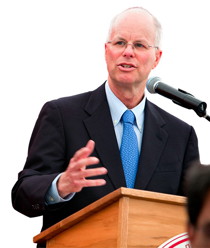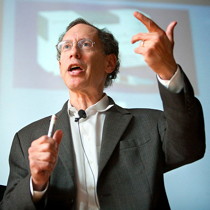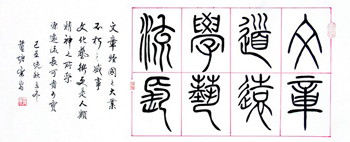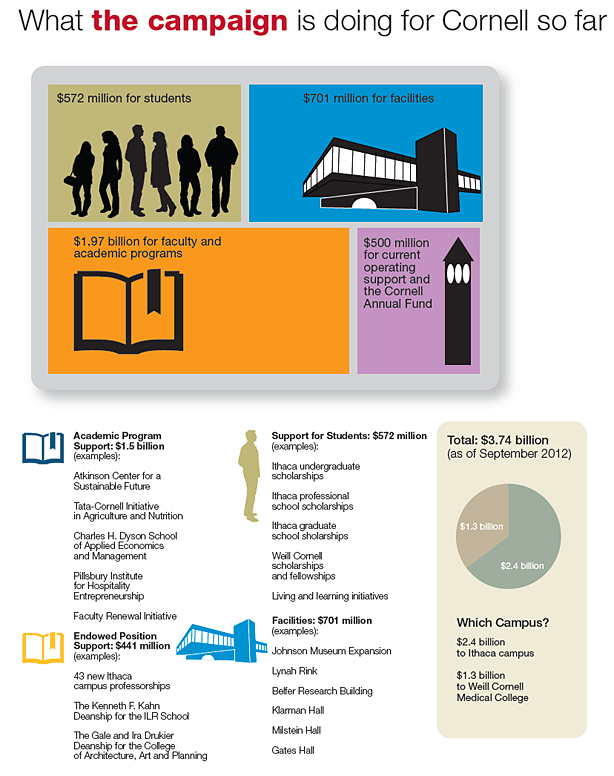CORNELL NOW
Cornell Now -- 2015

Stewart Schwab See larger image
On June 8, during the Cornell Law School Reunion Alumni and Faculty Lunch, Stewart Schwab, the Allan R. Tessler Dean and Professor of Law, announced that the school had received a $25 million commitment – the largest single gift in the school's history and one of the largest in the history of legal education – from an anonymous donor.
The gift will be placed in the school's endowment and used for faculty research, student financial aid, and a diverse array of national and international academic programs.
At the announcement, Schwab said, "This is a truly monumental gift that will enhance the quality of Cornell Law School for generations to come."
President David Skorton noted that the gift would allow the Law School to "further enhance its interdisciplinary scholarship and programs that enable Cornell University to engage with the world."
The gift represents a significant portion of the school's fundraising goal of $35 million during the Cornell Now campaign.
– George Lowery
EAST ASIA PROGRAM
Chinese calligraphy fellow endowed
"The path of letters is long and the course of learning runs far," reads the poem "The Art of Learning" (right) by distinguished educator, philosophical scholar and calligrapher Wong Chai Lok.
To honor this ancient Chinese art form and her 88-year-old father's accomplishments in it, Wong's daughter Vivian Webb, parent of Adam Webb '13, made a gift of $100,000 to establish the Wong Chai Lok Chinese Calligraphy Fellow Endowment in the East Asia Program. The gift will support short residencies for prominent calligrapher-scholars from China, during which they will hold workshops and lectures and exhibit their work at the Herbert F. Johnson Museum of Art.
"Professor Wong and his family's generous gift will offer us a unique opportunity to deepen our understanding of Chinese art, culture and history," says Hirokazu Miyazaki, director of the East Asia Program.
"Calligraphy has been revered for thousands of years in China and its practice closely associated with the life of the scholar," notes Ellen Avril, chief curator and curator of Asian art at the museum, which jointly administers the fellowship.
"I hope that this fellowship can bring artists to exchange ideas and share appreciation of this truly magnificent art form," Webb says.
– Metta Winter

Robert S. Langer See larger image
Perhaps the world's most lauded and oft-cited biomedical engineer, Robert S. Langer '70, the David H. Koch Institute Professor in the Department of Chemical Engineering at the Massachusetts Institute of Technology, has hundreds of patents to his name, was the first to develop controlled-release formulas for macromolecular drugs, and has invented materials, devices and new ways to engineer veins and other tissues and organs.
Langer's research and inventions have had such a significant impact on medicine that he has been awarded hundreds of prizes and honorary titles and awards, including four of the most prestigious: the United States National Medal of Science; the Charles Stark Draper Prize, considered the equivalent of the Nobel Prize for engineers; the Priestley Medal; and the Millennium Technology Prize.
In June, several anonymous donors made a commitment to name a professorship in Langer's honor: the Robert S. Langer '70 Family and Friends Professorship.
"Bob is extremely innovative – clinically, commercially, intellectually," says Mike Shuler, the James M. and Marsha McCormick Chair of Cornell's Department of Biomedical Engineering (BME), home to the Langer professorship, which will be awarded to a distinguished new member of the faculty.
The new professorship comes at an ideal time, explains Shuler, who is also the Samuel B. Eckert Professor of Chemical Engineering; BME is making plans to establish an undergraduate program and has set a goal of attracting funding for three new professorships.
Expanding the department to include an undergraduate major in addition to its current master's and doctoral programs would, if approved by the college and board of trustees, require an increase of the faculty by at least 50 percent, from a current 12 professors to at least 18.
"Cornell's biomedical engineering program, which is dear to my heart," says Langer, "has achieved a national reputation for excellence and now needs to grow in order to meet increasing student demand. And so, I am especially pleased that the timing of this professorship will allow BME to bring in a star faculty member fairly quickly to join the distinguished faculty who are already part of the program."
In an unusual gesture at a department meeting this summer, the members of the BME faculty voted unanimously to contribute their own money to the Langer professorship endowment, to "convey our role as friends as well as beneficiaries of the new chair."
– Emily Sanders Hopkins

